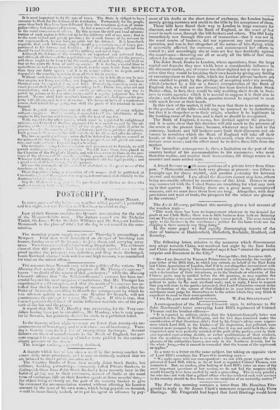A feature vi Melt has 151' I„Le shown itself in
the money-market be- comes daily more itrutttsuee lel is novs so distinctly marked that we are induced to direct public etieation to it.
The Country Banks or Issue (mit inerely Joint Stock Banks, but ordinary bankiog partherships, commonly called Private Bankers, to distinguish them from Joint Sisails liaiikers) h.iVe recently been in the habit of giving out to their customers, instead of drafts at the usual term of exchange, bills on their Lundoil estitits at three months' date,— the object being evidently on the port a the country banker to give Ills customer the accommodation wanted without affecting his London account by the issue of his own notes, which being payable on demand, ould be immediately cashed, or to put his agent in advance by pay-
ment of his drafts at the short dates of exchange, the London banker merely giving currency and credit to the bills by his acceptance of them.
These bills have found their way to London in large amounts for discount, and of course to the Bank of England, as the court of last revort in such cases, through the bill-brokers and others. The Old Lady immediately saw through this sort of transaction—that it was not in the usual course of basilic:7s, did not represent any real commercial operation, and was in fact altogether of the nature of kite-flying, while it materially affected the currency, and counteracted her efforts to curtail it ; and accordingly she at once set her face decidedly against the contrivance—throwing out all or nearly all the bills of that class
offered for discount or advance.
The Joint Stock Banks in London, whose operations, from the large capital and deposits they now wield, have a considerable influence it the discount-market, are of course too clear-sighted not at once to per- ceive that they would be breaking their own heads by giving any facility or encouragement to these bills, which the London private bankers are alone enabled to grant, by the privilege of accepting under six months, which (whether by a fair or a forced interpretation of the Bank of England Act, we will nut now discuss) has been denied to Joint Stock Banks—that, in fact, they would lie only enabling their rivals in busi- ness to retain agencies which it is natural to suppose it is their aim to obtain ; and therefore the bills in question cannot be expected to meet with much favour at their hands.
In this view of the matter, it will be seen that there is no question as to the goodness of the bills—which may be assumed to be undoubted; but that it is altogether as to their oriein, whether it be legitimate in the banking sense of the term, and is such as should be recognized. The Bank of England, it seems, has decided against the practice: and it is quite clear that this decision will add much to the pressure of the screw at the present time ; because, whatever may be said to the contrary, bankers and bill ibrokers must limit their discounts and ad- Tames to securities which this Bank of England will take off their hands, or their capital will soon be exhausted, when their accommo- dations must cease ; and the effect must be to drive these bills frosts the market.
The hnmediate consequence is then, a limitation on the part of the country banker of his accommodation 'to his customers; who mast therefore realize, and restrict their transactions, till things return to a sounder and more settled state.


























 Previous page
Previous page